Kurt Gänzl
Kurt of Gerolstein (Blog)
13 August, 2022
When you have spent more than 20 years researching and writing a book, when you have lived and breathed the life of your biographee day in, and day out, trudged round the world from library to library, and to ephemera shops from Hampstead to Hokitika to Hitchin, I think you have a right to be proud of the vast, thickly-illustrated, 1500 pages that are the result. It’s done. No one could ever do it more doggedly, in more (primary-sourced) detail, I thought … Then someone invented the Internet.
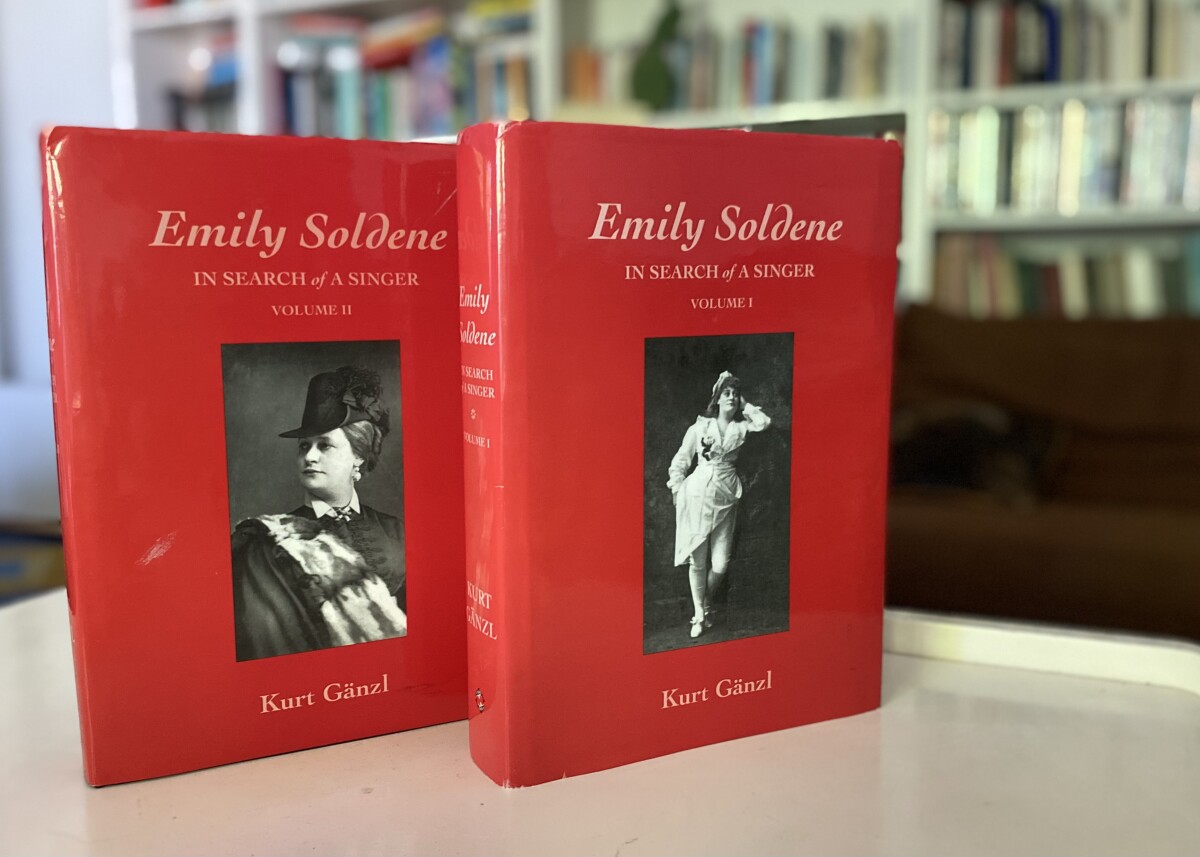
The two volumes of Kurt Gänzl’s annotated Emily Soldene biography. (Photo: Private)
And, as I haven’t stopped investigating anything and everything relating to the lady who was my companion for so many years, while I research the lives and works of many of her theatre contemporaries … comes a time, fifteen years on, when you come upon something and sigh ‘bugger, I could have done with that snippet, or with that photo’ for the Book. It’s not that I’ve made errors (as far as I know) but things that, 20-30 years ago, I dubbed unsolvable, I have now solved and occasionally a treasure turns up.
Well, my newest treasure is named Ethan Crenson. He lives in the US of A. And he is a great x 2 or 3 grandson of the splendid Charley Campbell, Emily’s leading man. Ethan has got quite a bit of Charley’s Nachlass and he has ever so kindly shared it with me. And allowed me to use it. I used his photo of the man himself (original cast of Trial by Jury) in my last book …
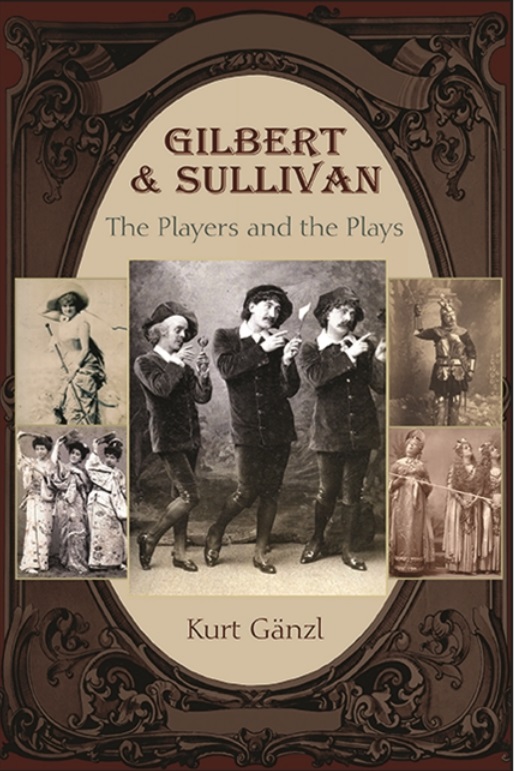
The new “Gilbert & Sullivan: The Players and the Plays” by Kurt Gänzl. (Photo: SUNY Press)
And yesterday he sent me some more pictures from a mostly unidentified folder. I went off like a train-whistle.
Emily’s ‘tour of the world’, one of the highlights of her career and an historical undertaking, started out from England.
3 November 1876 her troupe set out from Liverpool with an effective including femininely herself, one soprano, one sister, one wardrobe mistress and ten chorus girls/bit part players/dancers/etc. And an intermittent feature dancer.
Well, the book (Volume I) includes photos of soprano ‘Rose Stella’, of sister ‘Clara Vesey’, of principal dancer ‘Florence Slater’ (who married the conductor), of the glamorous ‘Cissie Durrant’ who married Heaps of Money, of Eugenie Nicholson (Mrs Charles Campbell), Julia Barber (‘wife’ of the stage manager), Nellie Beaumont and Marie Ferrara. Which left me with Ada Moxon, Una Brooke and Annie St George (wife of a male chorister).
Others, such as Alice Norton (photo got) were temporary additions. But the main changes came when, after a July season in San Francisco, the company set out for Australia. Eugenie went home, the Americans stayed in America, and two locals, Ella LeFevre and Mattie Daniel (photo got) topped up the chorus.
So, Moxon, Brooke, St George, Le Fevre. Four needed to make up the set.
From today it’s three. Amongst the better-known portraits – from Emily herself to Elsie Cameron (affectionately inscribed) – was one seemingly labelled ‘Ada Moron’.
Gotcha girl! After 30 years …
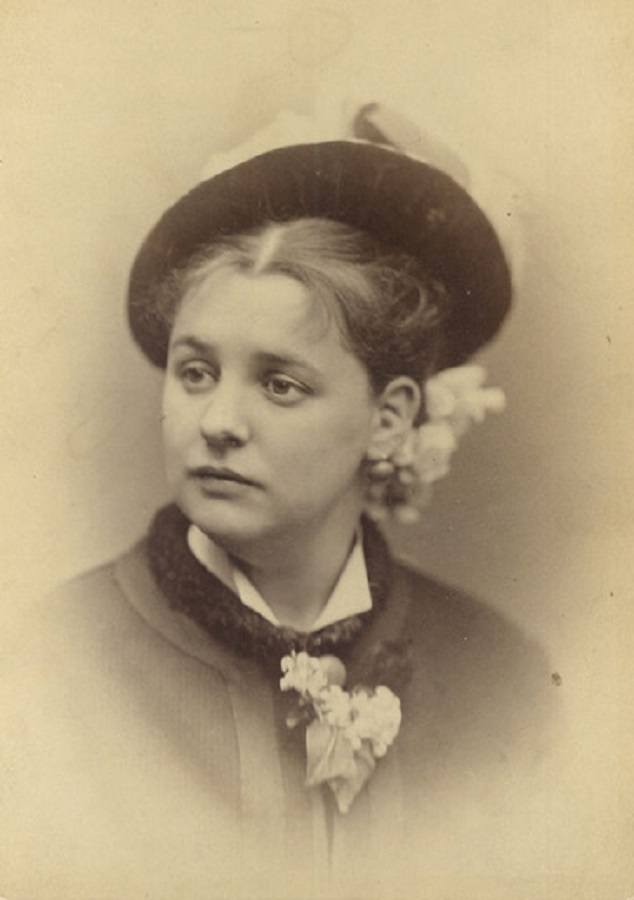
Portrait of Ada Moron. (Photo: Kurt Gänzl Collection)
Having such a beautiful picture, I thought she deserved a new effort at ‘identification’, so I dove into the bowels of the Internet … nothing. Then I checked my decades-old notes. Boy, I was thorough in those days! And I found what I was after. ‘Ada’ stayed in Australia, and in 1883 married what I now know was a fellow supporting operatic performer, George Ernest Haswell, of Liverpool.
Ada, herself, was no Ada. She was Elizabeth Moxon Tomlinson, born Leeds 16 April 1849, daughter of painter John Hirst Tomlinson (d 16 May 1877) and his wife Rebecca née Simpson ‘of North Cave’.
I see that in the 1871 census she was already listing herself as ‘actress’, but she doesn’t appear in my periscope till she joins Emily in 1876. She remained with the Soldene company throughout the whole of the tour, but when Emily returned to Britain, she – like several others of the company – stayed in Australia.
She played with George Musgrove’s company in a series of comic operas between 1880 and 1883, there met and married Haswell, and then joined Emelie Melville’s troupe, playing ‘as cast’ in an even wider repertoire of pieces (Patience, La Mascotte, Fatinitza, The Royal Middy, La Périchole, The Pirates of Penzance, HMS Pinafore, La Belle Hélène, Giroflé-Girofla, Maritana, La Fille de Madame Angot, Madame Favart, Olivette) in Australia and a hectic and too often financially fatal tour from Calcutta and Bombay to China, Japan, Manila as the company took on various shapes, sizes and managements.
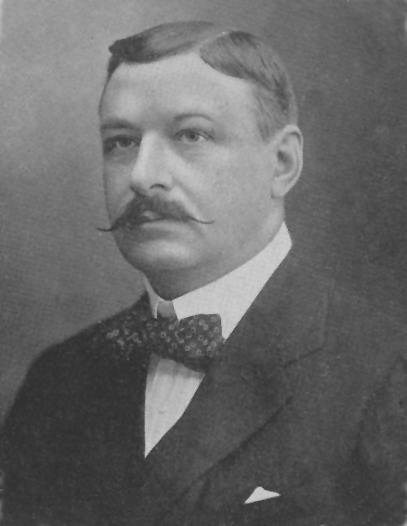
Australian theatre producer George Musgrove. (Photo: Wiki Commons)
The shoestring affair lasted, however, some four years, but the papers reported that Ada and George had ‘got away’ and were playing with a Mikado company in America. I see the couple next playing with the company headed by Florence Seymour and Willie Walshe (1889), and then with the Montague-Turner combination, and when Soldene tried again, too late, to play Sydney again, Ada was in the chorus (1892).

Emily Soldene (1838-1912), English actress and theatre-manager.
She also played small parts in the George Walton season which replaced that production (Mrs Dingle in Skipped by the Light of the Moon). My last sighting of her is in 1894, playing the character part of the Marchioness in Maritana and Sally Fox in Martha with Montague and Turner. Her husband is the Alcade and ‘a servant’. And then I lose her.
I assume that the George Ernest Haswell (how many of them can there be?) who set up as a merchant in Auckland in 1896 is our George. If it is, he had a wife named Ada Forgie who died in childbirth in 1904. So I suppose our Ada has gone.
Ah! Is she the Ada wife of George E Haswell who died 15 June 1902 ‘buried at Purewa’? George lived in Auckland for the rest of his life and died there 2 September 1922.
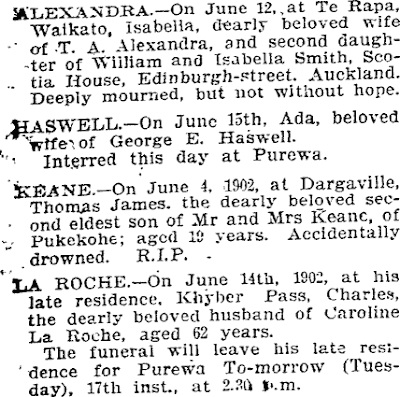
Newspaper clipping announcing the death of “Ada Haswell”. (Photo: Kurt Gänzl Collection)
Her grave says she was 50. Well, a little more!
RIP Ada. Now maybe I should have a go at Una?
Blogger me! Here’s Una! Nestling in the collection of my old chum John Culme …!
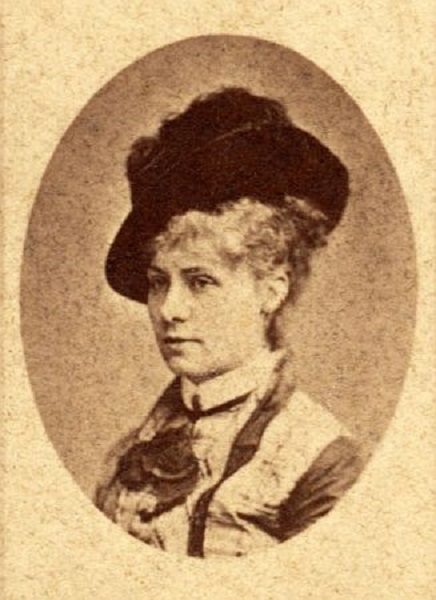
Portrait of Una Brooke. (Photo: Kurt Gänzl Collection)
Unfortunately, I don’t know her story. She became a Soldene chorine as early as 1873 and fulfilled five years as a step-out girl with Emily’s companies. She stayed in Australia after the end of the enterprise in 1878, and worked steadily with all the important managements for the next five years, after which I see her no more. She made the news – or the gossip pages – only once that I can see, when she and Fanny Morrell got involved somehow (or alternatively) with the young manager, George Musgrove (1881) during the record-breaking production of La Fille du Tambour-major. Since Una was still working with Musgrove and Williamson in 1883, I imagine there was no harm done.
Una never got beyond step-outs, but she was much liked, and in 1912 (25 August) when the Sydney Sun featured a group of stage beauties of the past, there was a grainy picture of Una!

Kurt Gänzl. (Photo: Private)
So, where did she come from? Where did she go? Who was she? I’m not there yet!
